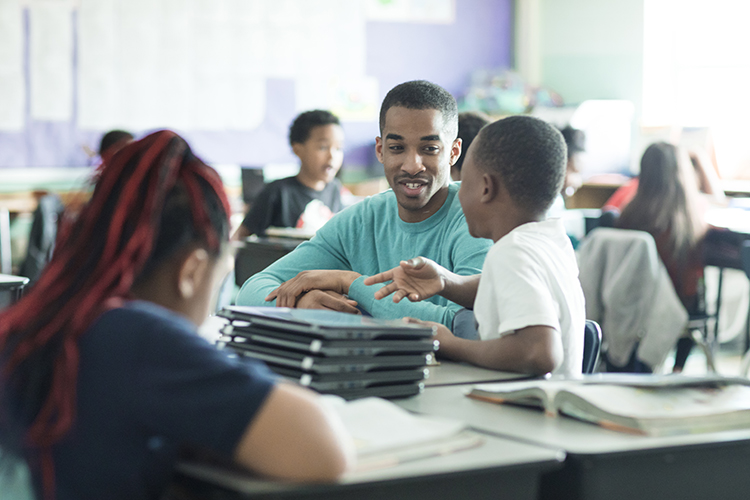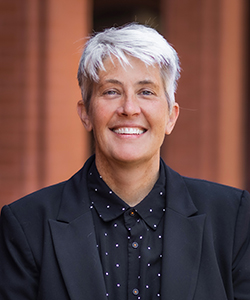
UWM student Ebenezer Keane-Rudolph works with students at Riverside Elementary School in 2019. Student teaching is one kind of experiential learning available to students. (UWM Photo/Elora Hennessey)
Academics plus hands-on experience make an unbeatable combination in the job market.
That’s why UWM is expanding opportunities for students to incorporate experiential learning into their university education.
The new focus is an outgrowth of the university’s 2030 plan. One key part of that plan is to make the university more student-centric while being responsive to local workforce and community needs. Developing a comprehensive student experiential learning framework to expand student opportunities for internship and other work-based experiences is one aspect of that goal.
“Universities think they do a great job of prepping students for the workforce and community leadership, but industry and parents don’t always see it that way,” said Laurie Marks, referring to a 2013 Lumina Foundation and Gallup Poll survey.
Marks serves as the executive director of the new Office of Student Experience and Talent, which will bring together the university’s experience-based learning opportunities such as academic service learning, internships and student employment and help integrate them with academic work and community service.
UWM ideally situated
UWM’s location in Wisconsin’s economic and cultural hub, with numerous businesses and organizations nearby, makes for an ideal base for this type of hands-on learning, according to Marks.

“We are quickly becoming the premier destination for experiential learning in Wisconsin, but our goal is for this identity to be known throughout the Midwest, and eventually to be part of the national conversation,” Marks said.
The Office of Student Experience and Talent will pull together existing programs on community service, student employment, career readiness and internships under one umbrella. In the future, the goal is to have all UWM bachelor’s degree candidates complete some form of experiential learning before graduation, Marks said.
That may sound like a challenge, but already an estimated 85% of undergraduates are participating in some form of hands-on learning through internships, clinical experiences, practicums, undergraduate research, leadership roles, service learning and student employment, Marks said.
One key goal is to give every student access to a paid internship. A recent $500,000 grant from the Department of Workforce Development will help support that effort. The grant will cover wages for student internships for 100 students in high demand fields.
Building connections
These internships can help students develop professional connections and build social capital – the community knowledge and experience as well as contacts in positions that can help students in future careers. Many young people, especially first-generation college students, do not always have those important professional connections through their families and friends, Marks said.
Because the internships are paid, many students who might otherwise not be able to afford to do an unpaid internship will be able to take part. Of the 140 students who have applied to the program so far, 84% are students of color, Marks said.
As an access institution located in the state’s largest city, UWM has a unique opportunity to partner with businesses and organizations to help students gain hands-on skills, Marks said.
Another aspect of the program will be to give UWM student employees the opportunity to develop skills, advance in wages and responsibility and gain leadership experience, she added. “It’s an effort to make student employment at UWM a stronger learning experience.”
Gaining soft skills
Internships, clinical experiences, service learning and student employment can help students develop skills employers are looking for.
“If you talk with industry leaders, they’re looking for graduates with soft skills, who are problem solvers and communicators,” Marks said. “These are things we can work on with experiential learning.”
The Office of Student Experience and Talent will also work with the Office of Strategic Partnerships to develop more relationships with corporate partners and expand existing partnerships.
The university will make career preparation and community leadership an ongoing part of the student experience.
“The focus will be on the entire freshman-to-senior-year experience,” Marks said. “Right now, traditional career preparation in students’ minds at UWM is something that happens right before you graduate – you get your resume reviewed and focus on which portal to use for the job search.
“We want freshmen to have exposure to career readiness, thinking about how to build a competitive resume and build valuable connections. One important step will be to integrate this work into appropriate classes.”
New ways to engage
Traditional career services efforts like the Career Closet, resume reviews, and job fairs will continue. While career services will be more centralized, there will be offices in the Lubar College of Business and the College of Engineering & Applied Science.
The new SET office will also look at new ways of having businesses and organizations engage with students, Marks said. In addition to traditional career fairs, for example, business leaders may visit classes to talk to students about their organizations and what type of careers they offer.
The office will continue to encourage volunteer efforts and work closely with community-based learning, which instructors can incorporate as part of coursework.
Helping faculty and instructors, especially those who are new to the area, learn more about Milwaukee and social justice issues will be a critical part of the process of preparing students to be community-minded citizens. For example, a group of instructors recently went on a bus tour to different locations in Milwaukee that are important to our city’s future – Alice’s Garden, the Sherman Phoenix and a south side mural, called “Culture Works – The UMOS Mural,” designed and painted by members of the UWM community.
A key goal of the Office of Student Experience and Talent is to continue to encourage graduates to stay in the community, and become contributing citizens, Marks said.
“We want to keep people here; retain the talent we have and nurture the talent pipeline. UWM is the primary artery of Milwaukee’s talent pipeline and an integral source of our civic leaders; it’s critical that these facts drive our campus identity and work.”
Written by Kathy Quirk
Link to original story: https://uwm.edu/news/new-effort-aims-to-make-uwm-a-premier-destination-for-experiential-learning/
